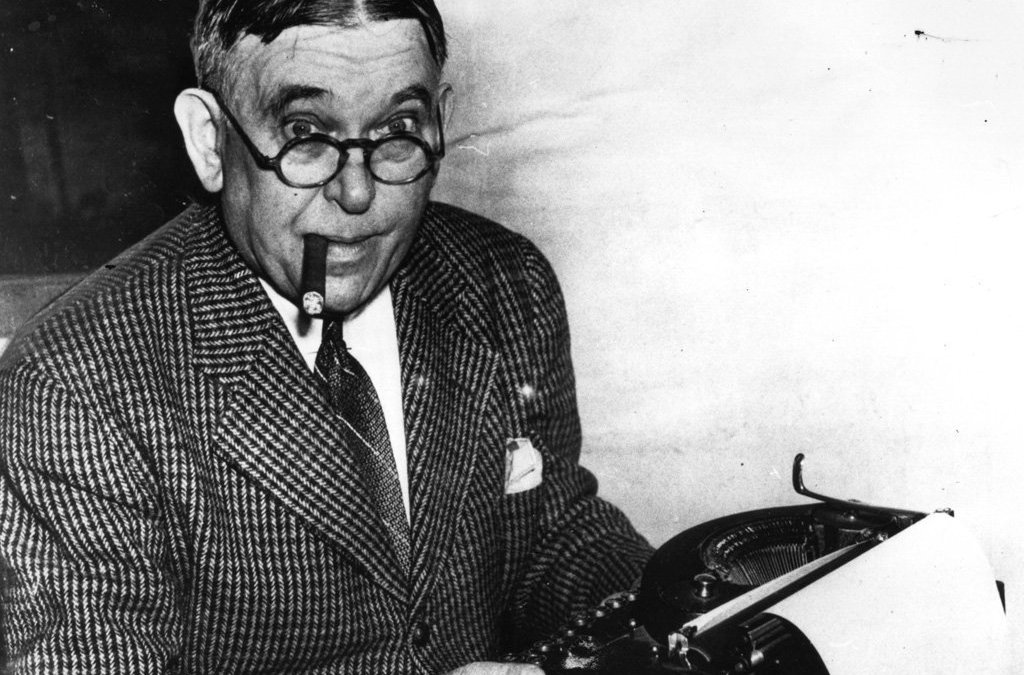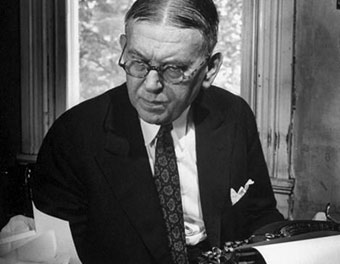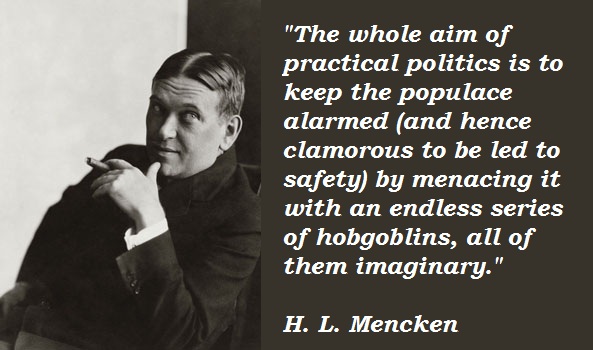American Literature
(Ohio University Press)
For those of us just emerging from our cocoons in the 1950s, discovering H. L. Mencken was like discovering beer, or sex, or how fun it was to be away from home. He had been published, prodigiously, during the first half of the 20th Century --- but by the time our generation came along, he had all but disappeared. It was the cognoscenti, at least in our circle, who kept the flame burning.For those of us growing up outside the Northeast intellectual hothouse, there was a double rapture: what a pleasure it was to have someone who could sneer at preachers, Rotarians, and what he referred to as "Bible-searchers" and "Homo boobiens,"
Mr. Bell makes much of the difference between the civilized individual and a civilized society. The former may exist anywhere, and at any time. There may be men and women hidden in Oklahoma who would be worthy, if he were alive, to consort with Beethoven. It is not only possible; it is probable. But Oklahoma is still quite uncivilized, for such persons are extremely rare there, and give no color to the communal life. The typical Oklahoman is as barbarous as an Albanian or a man of Inner Mongolia. He is almost unaware of the ideas that engage the modern world; in so far as he has heard of them he is hostile to them. He lives and dies on a low plane, pursuing sordid and ridiculous objectives, and taking his reward in hoggish ways. His political behavior is that of a barbarian, and his religious notions are almost savage. Of urbanity he has no more than a traffic cop. His virtues are primitive and his vices are disgusting.
Here we had a literate man who enjoyed offending all, and doing it in such an elegant fashion. In a review of Hemingway's Death in the Afternoon Mencken opined that we should consider bringing bull-fighting to the United States:
I emerge from the book cherishing a hope that bullfighting will be introduced at Harvard and Yale, or, if not at Harvard or Yale, then at least in the Lynching Belt of the South, where it would offer stiff and perhaps ruinous competition to the frying of poor blackamoors.
Once you land in the artful insult world of Mencken, you never want to leave, even when you realize that he is mocking everyone --- everyone, that is, except himself, and you.
One of the greatest joys of reading Mencken comes from the joy of his sour words on those tedious 19th Century American writers we had to struggle through in our English classes --- the likes of James Fenimore Cooper, Washington Irving, John Greenleaf Whittier, Nathaniel Hawthorne, William Cullen Bryant --- and the writer of "pious gurglings," Henry Wadsworth Longfellow.
Mr. Joshi has pulled together almost eighty reviews --- some long, some brief --- drawn from Mencken's years at The Smart Set and The American Mercury. The reviews encompass most every worthy American writer from Poe and Emerson up through Edith Wharton, Ring Lardner, Theodore Dreiser, Willa Cather, Sinclair Lewis, and T. S. Eliot. The writer he cares for, most of all, is Mark Twain:
I believe that Huckleberry Finn is one of the great masterpieces of the world, that it is the equal of Don Quixote and Robinson Crusoe, that it is vastly better than Gil Blas, Tristram Shandy, Nicholas Nickleby or Tom Jones. I believe that it will be read by human beings of all ages, not as a solemn duty but for the honest love of it, and over and over again, long after every book written in America between the years 1800 and 1860, with perhaps three exceptions, has disappeared entirely save as a classroom fossil.
He concludes,
I believe that he ranks well above Whitman and certainly not below Poe. I believe that he was the true father of our national literature, the first genuinely American artist of the blood royal.
The Blood Royal.
Gentle hyperbole; for Mencken, exuberant praise.
In my youth, I was so entranced by Mencken that I spent many happy weeks over at the university library laboriously copying all his book reviews from "The Library" column in The American Mercury. I read every one of them, and my experience was that Mencken was at his best when he was neither terribly fond of a book nor terribly irritated by it. The greatest reviews were used as jumping-off points --- he picked obscure titles that would give him the chance to show his encyclopædic knowledge ... and at the same time give us a whiff of some elegant asides. I recall with especial warmth the fist-in-
the- glove routine: where Mencken redeems one subject by trashing another. On the subject of "experts," he manages to skewer not only experts, but psychologists and policemen:
Are they to be got by putting want-ads in the New York Times? No such experts, I fear, really exist in the world. Even in the narrow field of psychiatry those who pretend to existence are mainly quacks, and judges and juries who believe even policemen commonly laugh at them.
Or here, note the sequential erosion of logic --- a pure Swiftian reversal --- with his thoughts on putting men into prison:
I have frequently advocated cleaner and more rational devices, that would dissuade them from crime or make them incapable of it, and yet leave free play for their courage and enterprise in useful fields, e. g., flogging for petty robbers and thieves, the amputation of the right forefinger for pickpockets, the pillory for such offenders as the Hon. Mr. Fall [Albert Fall, indicted in the Teapot Dome scandal], the ducking-stool for Methodist bishops, deportation to the Dry Tortugas for Prohibition agents.
In a review of a book by Joseph Wood Krutch, Mencken takes issue with the phrase "the meanness of human life," and in the process brings in historical comparisons that are winningly overstated:
This is more bologna. Human life is quite as spacious and charming today as ever it was. Shakespeare himself, compared to Wagner, lived like a pig. Aristotle, compared to Einstein, was an ignoramus. Is it a sign of decay that the Greek tragedies no longer make us tremble? Plainly not. It is a sign that we are better men than the Greeks were. They never invented anything half so ingenious as the printing press or the photographic camera. They never discovered anything as important as the cell. They never produced a political document to compare to the Bill of Rights. Their governments were transitory and corrupt, their wars were bloody and idiotic, their pleasures were barbaric, and their comforts were those of prisoners in a chain-gang.
It is the parallelisms, the careful building of reverse --- and perverse --- logic, the dazzling vocabulary that make his best reviews worth reading again and again. There is, too, his superb sense of balance and form, for he structures the essays to grab our attention from the very beginning. We include in our "Readings" section a review of the book Meet General Grant from The American Mercury. Pay especial attention to the assiduous demolition of Grant: "His imagination was the imagination of a respectable hay and feed dealer..." "He had a vague distaste for war, and dreamed somewhat boozily of a day when it would be no more."
Note, too, his creative vocabulary, his appeal to illogical logic --- and the sly demolition of others by what seems to be compliments: the author "is a man of Southern birth and grew up in the midst of the Confederate katzenjammer, but there is no sign of it in his narrative. He is magnificently impartial. The fustian of the Federal patrioteers does not deceive him..."
In a recent issue of the Los Angeles Times Book Review, a Brad Leithauser quoted one of Mencken's fond biographers: "it is often difficult to read him without tears of laughter streaming down one's face..."
Leithauser's response:
this is a difficulty that I, making my way through various stretches of Mencken over the years, have always managed to surmount.
What gives with this sourpuss? Perhaps he is offended by Mencken's characterization of Los Angeles. He referred to it as "a town that has more morons in it than the whole State of Mississippi."
In any event, when we come across maulings like this, we --- like Mencken --- can rest assured that the native-grown American Homo boobiens are alive and well, even in twenty-first century America.


